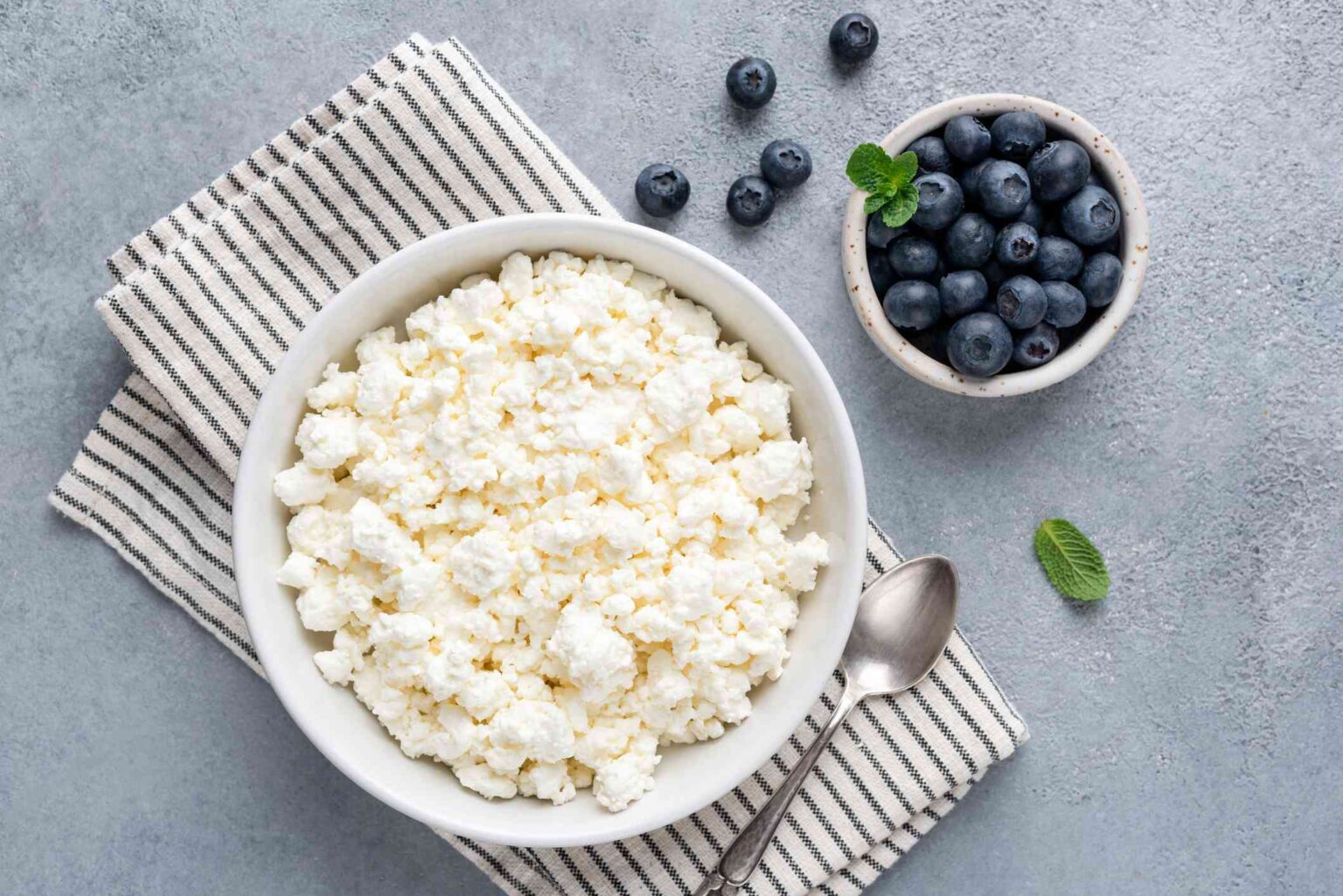Cottage cheese is a creamy, soft, white cheese made from pasteurized cow’s milk curds. It has many health benefits—it is relatively low in calories yet packed with protein, B vitamins, and other good-for-you nutrients. Additionally, low-sodium and lactose-free options make cottage cheese suitable for many diets.
Here’s everything you need to know about cottage cheese, including its nutrition, benefits, risks, and ways to incorporate it into your diet.
Cottage cheese has long been a popular choice among athletes and gym goers, thanks to its cost-effectiveness, ease of use, and high protein content.
When paired with strength training, protein has proven beneficial for muscle growth. It provides the amino acids necessary to rebuild and repair muscle tissue.
The protein in cottage cheese mostly comes from casein, a slow-digesting protein.
Studies suggest that consuming casein before bed, especially after strength training in the evening, may support muscle recovery. Researchers believe this is due to its ability to increase amino acid availability during sleep, prevent muscle protein breakdown, and reduce exercise-induced muscle damage.
Furthermore, there is evidence that dairy products can help prevent muscle breakdown and maintain muscle health in elderly adults.
Cottage cheese is a low-calorie, high-protein food that can help support your weight loss goals.
High protein diets have been linked to weight loss and the prevention of obesity and its related diseases.
This is partially because protein is more satiating and has a higher thermic effect than carbs and fat, meaning the body burns more calories digesting it.
One 2016 review found that increased intake of dairy products—when combined with a reduced calorie diet—can lead to a significant weight and fat loss without muscle loss. These effects are believed to be due to its protein and calcium content.
Several studies have linked calcium with weight loss, potentially by reducing fat production and increasing the breakdown of existing fat in the body. Calcium may also increase fat excretion in the stool.
Cottage cheese contains a decent amount of calcium, a mineral the body needs to maintain strong bones. Inadequate dietary calcium intake can lead to osteoporosis, which causes weak, fragile bones and an increased risk of fractures.
Cottage cheese is also a good source of phosphorus, which plays a vital role in bone health. Although extremely rare in the United States, inadequate phosphorus intake can lead to bone pain, muscle weakness, and osteomalacia, a condition that occurs when bones become soft and weak.
Additionally, the protein in cottage cheese may help prevent bone loss and reduce the risk of fractures in older adults.
The nutrition profile of cottage cheese varies depending on the type of milk used to make it. A half-cup serving of low-fat (1-2% milkfat) cottage cheese provides the following nutrients:
Calories: 93Protein: 12.4 grams (g)Fat: 2.6 gCarbs: 4.9 g
Selenium: 30% of the Daily Value (DV)Riboflavin: 20% of the DVVitamin B12: 20% of the DVSodium: 16% of the DVPhosphorus: 13% of the DVCalcium: 9% of the DV
As a dairy product, cottage cheese is considered a complete source of high-quality protein. That’s because it contains all nine essential amino acids that the body cannot make on its own.
Cottage cheese is an excellent source of selenium, a mineral that helps your body make unique proteins called antioxidant enzymes. These enzymes help protect cells from damage caused by free radicals (unstable molecules). Some studies also suggest that selenium may help ward off certain types of cancer and protect the body from the toxic effects of heavy metals.
It’s also a good source of riboflavin and vitamin B12, which help the body make energy from the foods you eat.
B12, in particular, is important for keeping your nerve and blood cells healthy and protecting against vitamin B12 deficiency anemia, which can cause fatigue and weakness.
Because cottage cheese is relatively high in sodium, consider opting for low-sodium varieties, especially if your healthcare provider has instructed you to limit sodium in your diet.
While cottage cheese is generally safe for most healthy individuals, it may cause side effects in some people.
Lactose Intolerance
Cottage cheese is a fresh cheese, which means it contains higher amounts of lactose than hard, aged cheese. This may cause symptoms like gas, bloating, diarrhea, nausea, and abdominal pain in people with lactose intolerance.
However, cottage cheese is lower in lactose than milk, with 0.7 to 4 g of lactose per one-half cup serving.
Some research suggests that lactose-intolerant individuals may safely tolerate up to 12 g of lactose in one sitting or 18 g spread throughout the day.
Therefore, some individuals with the condition may still be able to tolerate moderate amounts of cottage cheese.
Dairy Allergy
If you are allergic to cow’s milk, you should avoid cottage cheese, as it is made from milk.
When a person with a milk allergy consumes cottage cheese, they may experience hives, upset stomach, vomiting, or even anaphylaxis, a life-threatening condition that causes breathing problems.
Cottage cheese has a mild, creamy texture that is easy to include in sweet and savory dishes. Here are some ways to add cottage cheese to your diet:
Serve it with fruit: Pair cottage cheese with peach slices, berries, apples, mandarin oranges, or pineapple chunks.Add it to salads: Add cottage cheese to a mix of crisp greens, tomatoes, and dried fruit.Savory dishes: Incorporate cottage cheese into lasagna, stuffed shells, quiche, and meatloaf recipes.Baked goods: Mix cottage cheese into muffins, pies, biscuits, or bread.Toast: Top toast with cottage cheese, avocado, and a tomato slice for a protein-rich snack or breakfast option.Scrambled eggs: Add cottage cheese to boost the protein content and fluffiness of scrambled eggs.Dips: Substitute cottage cheese for sour cream or milk in various dipping sauces and veggie dips.
Cottage cheese is a nutritious food that is fairly low in calories yet high in protein, selenium, some B vitamins, and phosphorus.
The nutrients in cottage cheese may help support weight loss, muscle growth, and bone health. However, because of its high sodium content, people watching their salt intake should stick with low-sodium varieties.

